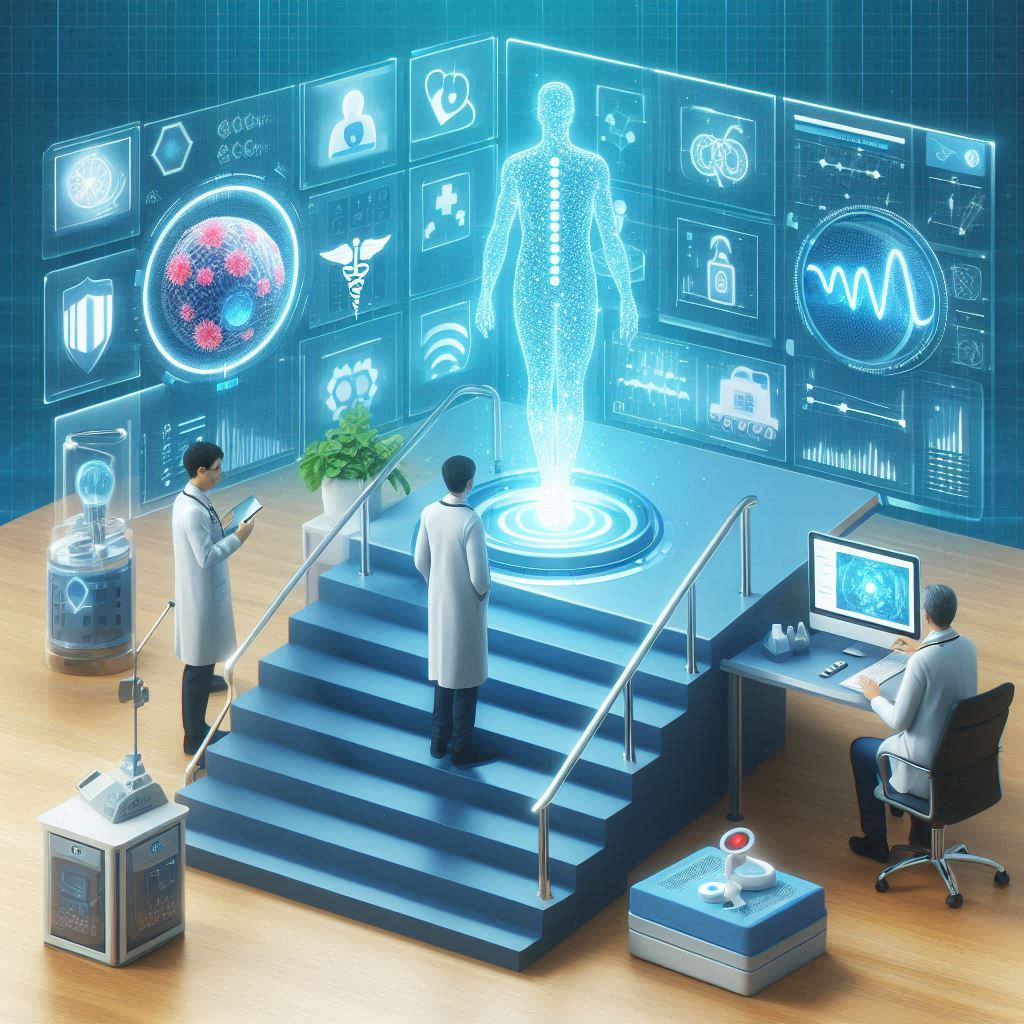Advancing Healthcare Through AI: From Diagnosis to Personalized Treatment
Artificial Intelligence (AI) is revolutionizing the healthcare industry, transforming how medical professionals diagnose diseases and treat patients. From enhancing diagnostic accuracy to providing personalized treatment plans, AI’s potential in healthcare is vast and growing rapidly. This article explores the various ways AI is advancing healthcare, supported by success stories and exemplary cases.
The Role of AI in Diagnosis
AI algorithms, particularly those based on machine learning and deep learning, have shown remarkable success in diagnosing diseases with high accuracy. These technologies analyze vast amounts of medical data to identify patterns that might be missed by human doctors.
For example, Google’s DeepMind has developed an AI system capable of diagnosing eye diseases with an accuracy comparable to that of human experts. This system can analyze retinal scans and detect conditions like diabetic retinopathy and age-related macular degeneration.
AI in Imaging
Medical imaging is one of the areas where AI has had a significant impact. AI-powered tools can enhance the quality of images, assist in early detection, and provide more accurate diagnoses.
Companies like Aidoc and IDx are leading the way in AI-driven imaging solutions. Aidoc’s AI software can detect acute abnormalities in medical images, allowing for quicker intervention. IDx’s AI system, IDx-DR, is the first FDA-approved AI diagnostic system for detecting diabetic retinopathy.
AI in Pathology
Pathology, the study of diseases through the examination of organs, tissues, and bodily fluids, is another field benefiting from AI. AI algorithms can analyze pathological slides with high precision, reducing the workload for pathologists and improving diagnostic accuracy.
For instance, Paige uses AI to assist pathologists in diagnosing cancer. Their AI models can detect cancerous cells in digital pathology slides with high accuracy, aiding in early diagnosis and treatment planning.
Personalized Treatment with AI
AI’s ability to analyze vast amounts of data enables the development of personalized treatment plans tailored to individual patients. This personalized approach considers a patient’s genetic makeup, lifestyle, and other factors to provide the most effective treatment.
AI in Precision Medicine
Precision medicine involves tailoring medical treatment to the individual characteristics of each patient. AI plays a crucial role in this field by analyzing genetic data and identifying the best treatment options.
Companies like Tempus and Foundation Medicine are pioneers in precision medicine. Tempus uses AI to analyze clinical and molecular data, providing oncologists with insights to personalize cancer treatment. Foundation Medicine’s AI-driven platform helps match patients with the most appropriate targeted therapies and clinical trials.
AI in Drug Discovery
AI is also transforming drug discovery by predicting how new drugs will interact with the human body. This accelerates the development of new medications and reduces the cost of bringing them to market.
Companies such as Insitro and Exscientia are leveraging AI for drug discovery. Insitro uses machine learning to model biological systems and predict the outcomes of potential drug candidates. Exscientia’s AI platform accelerates the drug design process, identifying promising compounds faster than traditional methods.
Improving Patient Care with AI
Beyond diagnosis and treatment, AI is enhancing overall patient care. AI-powered chatbots and virtual assistants provide patients with 24/7 support, while predictive analytics help healthcare providers manage resources more effectively.
AI in Telemedicine
Telemedicine has gained popularity, especially during the COVID-19 pandemic. AI enhances telemedicine by enabling remote monitoring and providing real-time data analysis.
Platforms like Amwell and Virtumedix utilize AI to offer virtual consultations and monitor patients remotely. These platforms use AI to analyze patient data, providing doctors with valuable insights to make informed decisions.
AI in Predictive Analytics
Predictive analytics powered by AI can forecast patient outcomes, identify at-risk patients, and optimize hospital operations. This leads to better resource management and improved patient care.
For example, Health Catalyst and H2O.ai offer AI solutions for predictive analytics in healthcare. Health Catalyst’s platform helps healthcare organizations use data to predict patient needs and improve outcomes. H2O.ai provides tools for building predictive models that assist in clinical decision-making and operational efficiency.
Challenges and Ethical Considerations
Despite its potential, the integration of AI in healthcare comes with challenges and ethical considerations. Data privacy, algorithmic bias, and the need for robust regulatory frameworks are critical issues that need to be addressed.
Data Privacy
Healthcare data is highly sensitive, and protecting patient privacy is paramount. Ensuring that AI systems comply with regulations like the Health Insurance Portability and Accountability Act (HIPAA) is essential.
Organizations must implement strong data encryption and access controls to safeguard patient information. Companies like CipherHealth and Protenus specialize in data security and compliance, helping healthcare providers protect patient data.
Algorithmic Bias
AI algorithms can inadvertently perpetuate biases present in the training data. Ensuring that these systems are trained on diverse datasets is crucial to minimize bias and provide fair treatment to all patients.
Initiatives like AI for Health and Partnership on AI are working towards addressing algorithmic bias and promoting ethical AI use in healthcare.
Regulatory Frameworks
Robust regulatory frameworks are necessary to ensure the safe and effective use of AI in healthcare. These frameworks should address issues like data privacy, algorithmic transparency, and accountability.
Organizations like the U.S. Food and Drug Administration (FDA) and the European Commission are actively working on developing regulati



Pros and Cons of AI in Healthcare
While AI offers numerous advantages in healthcare, it also presents certain challenges and ethical considerations. This section outlines the pros and cons of AI in healthcare, providing a balanced view of its impact on the industry.
Pros of AI in Healthcare
| Advantage | Description | Examples |
|---|---|---|
| Improved Diagnostic Accuracy | AI algorithms can analyze large volumes of medical data, identifying patterns and anomalies with high precision, often surpassing human capabilities. | Google’s DeepMind accurately diagnoses eye diseases from retinal scans. |
| Enhanced Imaging | AI-powered imaging tools can improve image quality and assist in early disease detection. | Aidoc and IDx provide advanced imaging solutions. |
| Personalized Treatment Plans | AI analyzes patient data to develop individualized treatment plans, improving patient outcomes. | Tempus and Foundation Medicine lead in precision medicine. |
| Accelerated Drug Discovery | AI predicts drug interactions, speeding up the drug discovery process and reducing costs. | Insitro and Exscientia are at the forefront of AI-driven drug discovery. |
| Better Resource Management | AI helps healthcare providers manage resources more efficiently, improving patient care and operational efficiency. | Health Catalyst and H2O.ai offer predictive analytics solutions. |
Cons of AI in Healthcare
| Disadvantage | Description | Examples |
|---|---|---|
| Data Privacy Concerns | Handling sensitive healthcare data requires stringent security measures to protect patient privacy. | Ensuring compliance with regulations like HIPAA is crucial for AI systems. |
| Algorithmic Bias | AI systems can inherit biases from training data, leading to unequal treatment outcomes. | Initiatives like AI for Health aim to address and mitigate biases. |
| Regulatory Challenges | Developing and implementing robust regulatory frameworks is essential to ensure safe AI use in healthcare. | Organizations like the FDA work on establishing guidelines for AI in healthcare. |
| High Implementation Costs | Integrating AI technologies into existing healthcare systems can be expensive and resource-intensive. | Healthcare providers need to weigh the costs and benefits of AI adoption. |
| Lack of Standardization | There is a need for standardized protocols and practices to ensure interoperability and reliability of AI systems. | Efforts are underway to develop common standards and practices for AI in healthcare. |
Conclusion
AI is undoubtedly transforming healthcare, offering numerous benefits such as improved diagnostic accuracy, personalized treatments, and enhanced patient care. However, it is crucial to address the challenges and ethical considerations associated with AI to fully realize its potential. By balancing the pros and cons, the healthcare industry can harness AI to improve patient outcomes and advance medical science.
Frequently Asked Questions (FAQs)
1. What is the role of AI in healthcare diagnosis?
AI plays a significant role in healthcare diagnosis by analyzing large volumes of medical data to identify patterns and anomalies. This can lead to more accurate and timely diagnoses. For instance, Google’s DeepMind has developed an AI system capable of diagnosing eye diseases with an accuracy comparable to that of human experts. To learn more, visit the DeepMind website.
2. How does AI enhance medical imaging?
3. What is personalized treatment in healthcare?
Personalized treatment, also known as precision medicine, involves tailoring medical treatment to the individual characteristics of each patient. AI plays a crucial role in this field by analyzing genetic data, lifestyle, and other factors to provide the most effective treatment options. Companies like Tempus and Foundation Medicine are pioneers in using AI to personalize cancer treatment.
4. How is AI used in drug discovery?
AI is transforming drug discovery by predicting how new drugs will interact with the human body, accelerating the development of new medications, and reducing costs. Companies such as Insitro and Exscientia leverage AI to model biological systems and predict the outcomes of potential drug candidates, significantly speeding up the drug design process.
5. What are the benefits of AI in telemedicine?
AI enhances telemedicine by enabling remote monitoring and providing real-time data analysis, which is especially beneficial during situations like the COVID-19 pandemic. Platforms like Amwell and Virtumedix use AI to offer virtual consultations and monitor patients remotely, helping doctors make informed decisions based on real-time data.
6. How does AI improve patient care through predictive analytics?
Predictive analytics powered by AI can forecast patient outcomes, identify at-risk patients, and optimize hospital operations, leading to better resource management and improved patient care. For example, Health Catalyst and H2O.ai offer AI solutions that help healthcare organizations predict patient needs and improve clinical decision-making and operational efficiency.
7. What are the main challenges of implementing AI in healthcare?
Implementing AI in healthcare comes with several challenges, including data privacy concerns, algorithmic bias, high implementation costs, and the need for robust regulatory frameworks. Ensuring compliance with regulations like HIPAA and developing standardized protocols for AI systems are crucial to overcoming these challenges. For more information, visit the HIPAA website.
8. How can AI help address data privacy concerns in healthcare?
To address data privacy concerns, healthcare organizations must implement strong data encryption and access controls. Companies like CipherHealth and Protenus specialize in data security and compliance, helping healthcare providers protect patient information and ensure regulatory compliance.
9. What steps are being taken to mitigate algorithmic bias in AI healthcare systems?
Mitigating algorithmic bias in AI healthcare systems involves ensuring diverse training datasets and promoting transparency in AI algorithms. Initiatives like AI for Health and Partnership on AI are dedicated to addressing algorithmic bias and promoting ethical AI use in healthcare.
10. What is the future of AI in healthcare?
The future of AI in healthcare is promising, with continuous advancements expected in diagnostic accuracy, personalized treatment, drug discovery, and patient care. However, it is crucial to address the associated challenges and ethical considerations to fully harness AI’s potential. For the latest updates on AI in healthcare, follow the Healthcare IT News.
Disclaimer and Caution
The information provided in this article is for educational and informational purposes only. While we strive to present accurate and up-to-date information, the rapidly evolving nature of AI in healthcare means that new developments may have occurred since the publication of this article. Therefore, it is essential for readers to consult with medical professionals and trusted sources for the latest information and personalized medical advice.
General Information
AI technologies in healthcare are continuously developing, and their application varies widely depending on the specific use case, medical field, and regional regulations. The effectiveness and accuracy of AI tools can differ based on the quality of the data they are trained on, the algorithms used, and the clinical context in which they are applied. It is important to understand that AI is not a replacement for human medical professionals but rather a tool that can assist them in providing better care.
Consulting Medical Professionals
AI can offer significant benefits in diagnostics, treatment planning, and patient management. However, any decisions related to health and medical care should always involve consultation with qualified healthcare providers. AI-generated insights should be considered as supplementary information and not the sole basis for any medical decision. Always seek the advice of your physician or other qualified health providers with any questions you may have regarding a medical condition or treatment.
Data Privacy and Security
The use of AI in healthcare often involves the processing of sensitive personal health information. Ensuring the privacy and security of this data is paramount. Readers should be aware of the data privacy policies and security measures of any AI-based healthcare tools they use. Compliance with regulations such as the Health Insurance Portability and Accountability Act (HIPAA) in the United States is crucial. It is recommended to review the privacy policies of AI service providers and understand how your data will be used and protected.
Algorithmic Bias
AI systems can sometimes exhibit biases based on the data they are trained on. These biases can lead to unequal healthcare outcomes, particularly for underrepresented groups. Efforts are being made to address these biases, but it is essential to remain cautious and critical of AI-generated insights. Understanding the limitations and potential biases of AI tools is crucial for their effective and fair application in healthcare.
Regulatory and Ethical Considerations
The integration of AI into healthcare systems must comply with regulatory standards to ensure safety and efficacy. The regulatory landscape for AI in healthcare is still evolving, and it is essential to stay informed about the latest guidelines and requirements set forth by relevant authorities such as the Food and Drug Administration (FDA) in the United States. Ethical considerations, including informed consent, transparency, and accountability, should also be a priority when implementing AI solutions in healthcare.
High Implementation Costs
Implementing AI technologies in healthcare settings can be costly and resource-intensive. Healthcare organizations need to carefully evaluate the cost-benefit ratio and ensure they have the necessary infrastructure and expertise to support AI integration. While the long-term benefits of AI can be substantial, the initial investment can be significant, and not all healthcare providers may have the resources to adopt AI solutions effectively.
Continuous Monitoring and Evaluation
AI technologies require continuous monitoring and evaluation to ensure they perform as expected and do not introduce new risks or challenges. Healthcare providers should establish robust protocols for the ongoing assessment of AI tools, including regular audits, performance reviews, and updates based on the latest research and clinical evidence. Feedback from medical professionals and patients is crucial for refining and improving AI systems.
Responsibility and Liability
The use of AI in healthcare raises important questions about responsibility and liability. In cases where AI-generated recommendations lead to adverse outcomes, it may be challenging to determine accountability. Clear guidelines and agreements should be established regarding the roles and responsibilities of AI developers, healthcare providers, and other stakeholders. Legal frameworks need to evolve to address these issues effectively.
Future Developments
The field of AI in healthcare is rapidly advancing, and new innovations are constantly emerging. Staying informed about the latest developments is essential for making the most of AI’s potential benefits. Subscribing to reputable medical journals, attending industry conferences, and participating in professional networks can help healthcare providers stay up-to-date with the latest trends and best practices in AI.
Conclusion
AI holds great promise for advancing healthcare, but its implementation must be approached with caution and responsibility. By understanding the benefits and challenges of AI, consulting with medical professionals, prioritizing data privacy and security, and adhering to regulatory and ethical standards, we can harness the power of AI to improve patient outcomes and revolutionize medical care.
For more information and resources on AI in healthcare, visit the following links: